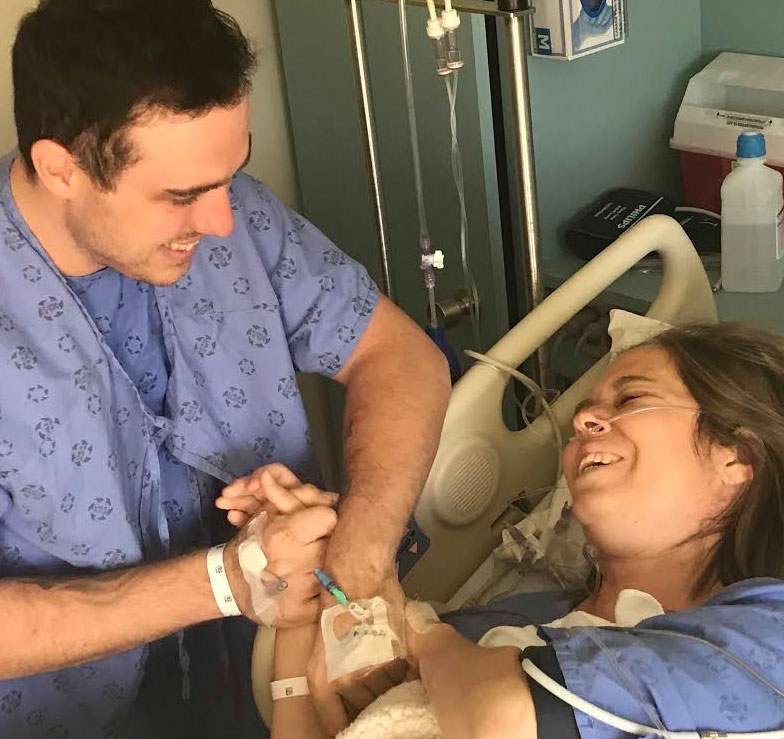Blog
Second Life

You Won’t Live Past Twenty
Kris Woods, a House Leader in L’Arche Antigonish, got a call from Joanna Macleod that changed his life, and hers.
“I need a new kidney,” she said.
Kris first met Joanna in L’Arche London, Ontario. She encouraged Kris to join L’Arche, and he did. They lived and worked side-by-side for six years until Kris moved to Nova Scotia. Still, they managed to see each other a few times a year and occasionally called one another about matters of life and faith.
But this call was different.
Joanna said she was leaving L’Arche indefinitely. As a child, she had been diagnosed with polycystic kidney disease. One doctor said she wouldn’t live past twenty, and if she did, he’d write a book about her. Almost forty years later, there was no book, but there was Joanna, who had lived a full and healthy life--until recently.
“I need a new kidney,” she told Kris during the fated call.
Kris didn’t hesitate. “I’ll give you mine.”
Had Kris understood that offering a kidney would mean eighteen months of testing, an invasive surgery and up to three months of recovery? Those were insignificant details to Kris. “She saved my life first,” he said. “She introduced me to L’Arche and to God.” Now it was his turn to save hers.
But it wasn’t that simple. Joanna felt a sense of guilt putting Kris through this ordeal, and it wasn’t easy leaving her fate in someone else’s hands—no matter who that person was. At any point during the year and a half of testing right up to the minute before the operation, Kris had the right to withdraw—but his conviction never waned.
As Joanna’s health declined, the transplant was fast-tracked to the earliest possible date. Kris traveled from Nova Scotia to the renowned London Health Sciences Centre. Surrounded by loved ones, Kris and Joanna awaited the transplant side by side, hand in hand.
There’s No Match
After Mark’s older sister, Malgosia, was diagnosed with aplastic anemia (in which the body fails to produce blood cells) there ensued a race to find a bone marrow donor. The Red Cross scanned the globe for a suitable donor--no match.
Usually, the patient’s home is the first place a doctor will search. There’s a thirty-percent chance that a sibling will have the genetic markers necessary to make a match. But the doctors never considered Mark. He was born with cerebral palsy and the doctors determined that the twenty-five year-old Mark could not legally consent to an invasive procedure.
Mark and Malgosia’s mother, Margaret, advocated on Mark’s behalf to at least have him tested as a potential donor. He proved a perfect match.
After many discussions with a doctor, it was decided that Margaret could consent to the procedure for her son.
Both Mark and Kris risked their lives to help their loved ones. Though their feats were heroic, their names will never appear in the headlines, or alongside a building. Yet what they donated couldn’t be matched by the largest bank account.
“What mother could make such a decision for their child?” she asked. “If complications arose from the procedure, I could lose both my son and my daughter.” So Margaret took the life she was handed and gave it to its rightful owner.
She discussed the situation with Mark, and with a willingness not unlike Kris’s, Mark decided to help.
Despite his fear of needles, Mark endured many blood tests over several months in the lead up to a much bigger challenge: his marrow would be harvested from his hipbone with a needle so large, it could empty a tattoo parlor. Also, during the procedure, Mark had to remain completely still, despite the involuntary tremors that could inflict him at any moment.
Like Kris, Mark was repeatedly told that he could back out of the procedure at any time, but he never hesitated. “I wanted to save my sister’s life,” he said.
Both Kris and Mark’s procedures were successful. Less than two days after the kidney transplant, Kris was back on his feet. And less than one week after the bone marrow transplant, Mark was up and bowling.
Today, Mark’s sister is a veterinarian, and Joanna lives her “second life” to the fullest.
Both Mark and Kris risked their lives to help their loved ones. Though their feats were heroic, their names will never appear in the headlines, or alongside a building. Yet what they donated couldn’t be matched by the largest bank account. Today, we want to pause and say “Thank you” to Kris and to Mark and to all those Canadians who hear people’s needs and respond, with unwavering conviction: “I’ll give you mine.”
Make a Donation Now
Themes
- Accessibility
- Advocacy
- Aging
- Amitié
- Apprentissage
- Artist
- Belonging
- Care
- Caring for Others
- Celebration
- Collaboration
- Communication
- Community
- Contributions
- Core Members
- Creativity
- Daily Life
- Day Center
- Day Program
- Disability Arts
- Diversity
- Gifts and Abilities
- Gratitude
- History
- Inclusion
- Institutions
- Intentional Community
- Leadership
- Legislation
- Life-sharing
- Listening
- Mission
- More Human Society
- Mutual Relationships
- Neighbourhood
- Outreach
- Partnership
- Personal Journey
- Persons with Disabilities
- Policy
- Project
- Respect
- Responsibility
- Rights
- Service to Others
- Society
- Solidarity
- Story
- Teamwork
- Togetherness
- Traditions
- Values
- Vision
- Well-Being
- Workshop
- World
